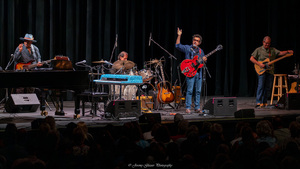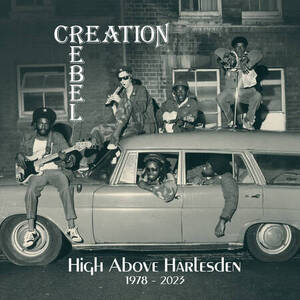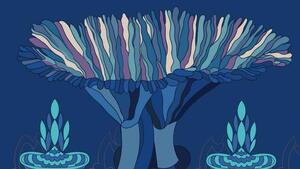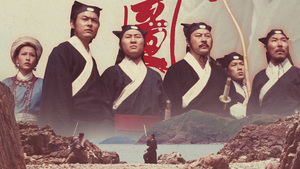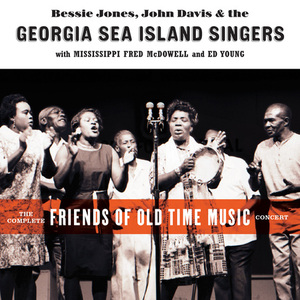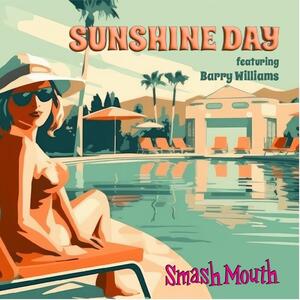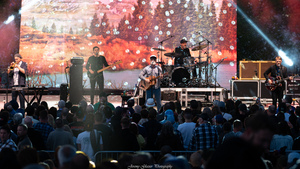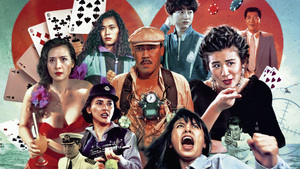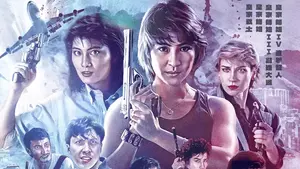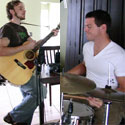
The Oaks
Jen Cray
The Oaks are more than a band, they’re a humanitarian effort. The Central Florida band is the brainchild of Ryan Costello and Matt Antolick. Costello spent two years in the mountains of Afghanistan helping refugees get back on their feet after the Taliban destroyed their villages, and Antolick has a master”s degree in philosophy and environmental ethics. Together they have found a way to make beautiful music, while spreading a message of awareness.
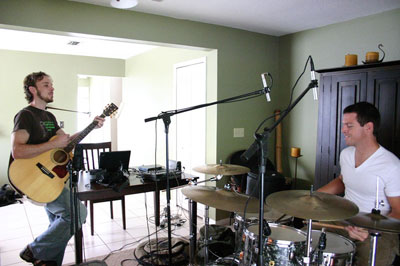
Interview with Matt Antolick
How did you and Ryan first meet and start making music?
I was going to school at USF and my wife was an assistant manager at the apartment complex where we lived, and I was studying philosophy. I was studying percussion, and then turned to philosophy, but was always still playing music. We met because he ended up moving into the complex, like the building just over from me. My wife came home one day and said, “I met this really cool guy, he plays guitar, you two should totally meet.” I went over to his house, that night, and we sat down… It was just instant musical chemistry. We played in this band, in Tampa, called Figure vs. Ground. It was Ryan on keyboards and guitars with looping pedals, me on drums and another guy on stand up bass and looping pedals. We just did live improvisation in clubs and coffeehouses in Tampa.
Right around the time I graduated, in 2003, with my master’s in philosophy, was when he decided to go to Afghanistan. We parted ways for a couple of years, and then he came back and we started work on this album. He would get some ideas and email them to me, MP3s and stuff like that. We traded ideas back and forth. The correspondence wasn’t frequent because, ya know, it’s hard to get to an internet cafe in Afghanistan sometimes. (laughs)
What were your thoughts on the musical ideas, thoughts, and experiences that he brought back with him from Afghanistan?
That gets into a lot of different layers with the both of us. I was studying philosophy at the time, and he was always really into the history of social movements- he was actually studying pre-med at the time. We’d get together at night and the two were always intertwined. We’d play music and then we’d end up putting our instruments in our laps and getting into some philosophical conversation. We’d always been on the same page, not just musically, but intellectually. It’s like they’re both kind of aesthetics for us. For instance, the reason we called our first band Figure vs. Ground came out of Gesalt psychology and this play of perception, and figure and background. It’s all about how you perceive reality and how it’s sometimes manipulated. We were really heady at the time.
He went to Afghanistan and I moved to Orlando. We were both leaving school and going into the “real world.” I’d been a student my whole life… my intellectual crisis was, like, “here I am teaching people about the real world- ‘cause I’m teaching philosophy- yet I’ve never spent any real time in it. I’ve never been a part of the working world, I’ve been a perpetual student.” So I had to throw myself out in the world and be a human being. I felt like, what right do I have to tell people how to live their life if I haven’t lived mine. At the same time, Ryan really threw himself out there!
So when he came back to me with this lyrical content that I could totally relate to. I mean, I’m not out there in Afghanistan, but we’re both on this kind of pilgrimage. We’re both in this weird transition between being kids and being adults. A lot of self confrontation takes place. I’m out in the world and I’m facing not only these outward limitations, but these inward limitations…The songs are kind of born out of that…
Why did you choose music as a medium, with all of your education? Why not go into politics?
I don’t know, that’s a good question. There’s this quality about music where you can get together people from all different walks of life if you put them in a concert, they’re all dancing and clapping together. Music has this way of cutting across all linguistic barriers. The feeling of the songs is like an impression of the lyrical content. You sit down and you read a poem and you have the words in front of you and they mean something, but it’s a challenge to express feelings and meanings through tones and textures and musical shapes.
What’s the ultimate goal for the band?
The humanitarian side of it is really important to us. The ultimate goal is to be in the position where enough people are hearing us, not us as individuals, but for the causes we’re talking about. For instance, this first album, half the money is going to Afghanistan. Every time we release an album it will benefit a different part of the world. It’s the synergy of humanitarian work, as well as giving people good music to listen to. I went into philosophy for a reason, because I wanted to change things… we just want to be a positive force in the world, as corny as that sounds.
Interview with Ryan Costello
What inspired you to go to Afghanistan?
There were a lot of different factors that played into that. September 11th kind of pointed my eyes to that part of the world. In a week’s time my car blew up, I lost my job and I got really sick. That was in October of 2001, I think. It just felt that everything was taken away from me that I took for granted and valued. I was just laying in bed, and I don’t know why I got sick- whether it was physical or something that went along with losing my car and my job- but I was realizing the emptiness of my life up to that point. I had some real epiphany moments there, and I definitely feel like there’s a spiritual connection to that- that there’s a spiritual depth to all that happened to me in that year. Everything just kind of needed to realign. Part of that was, what I felt to be, this calling inside of myself to this part of the world. I didn’t know that it was Afghanistan, I didn’t really realize that I was gonna go to Afghanistan, but I had this feeling that everything was changing for me. What was gonna come next was gonna be completely different and related to that part of the world, because I found myself really fixed on it. It was a very impacting year for me. (laughs)
What was your impression, what was it like, when you actually stepped foot in the Middle East?
The first time I went was in February of 2003, on a two-week trip. My first impression, I was just overwhelmed by the poverty. I had no idea what it would be like. I had been wanting to go there for so long, and then when I stepped off the plane I thought, “I really have no clue about this country.” I didn’t really read about it, I just kind of knew I was going there and worked toward that. So when I got there it really blew my mind! The landscape was completely barren and brown and the poverty was really deep. That was what I first saw, but then later all of that kind of goes away and you get to know the people.
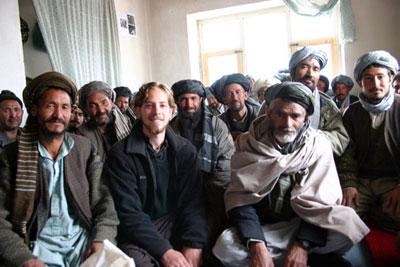
And then you worked with refugees when you moved there?
Yeah, I moved there in late 2003, and I lived there for two years. I spent a lot of time working out in the central mountain area. This area was one of the worst areas hit by the Taliban. They pretty much felt like the people of this whole region- who were Shiite and Muslims- were heretics and they came against them and destroyed whole villages. Just hundreds, and thousands of people, and whole small mountain towns- just mowed people down with machine guns in 2000. When I got there people were just starting to come back, and we thought, “What can we do to help these people?” So that was how I ended up working in this village out in the central mountain areas, about 12,000 ft. up. The people were just starting to come back to their villages, after being refugees in Pakistan or Iran. They came back and found everything destroyed, and were thinking, “How are we gonna get back on our feet?” I was really priviliged to come in and try to be creative with them, see what we could do to help.
In the midst of all that, how did the musical ideas begin to formulate? Did you meet musicians there?
I did! There are a lot of really cool local Afghan musicians and there’s an underground art scene. There’s actually a recording studio in Kabul that I spent some time in, believe it or not. (laughs) Aghan expatriates, from overseas, came back and started a recording studio there. I didn’t really start to record over there, I just sketched out ideas on my guitar. I started to think about what it would mean to write songs that carried a meaning to them, of some of these experiences that carried a complexity of melody and rhythm, a way that the songs would be deep enough to be able to express whatever lyrically I wanted to lay on them. I would send Matt songs by email – I still felt really connected to him musically in a lot of ways.
So it started more in terms of melody, and the vibe, as opposed to the lyrics?
Yeah, definitely. Usually I’ll write a song just sketching out a feel, on the guitar. I didn’t really think of the orchestration we were able to add over the past year- I didn’t think to that level. I just thought in layers of guitars and melodies and things like that.
When you moved back over here, after your two years in Afghanistan, did you find it difficult to adjust to your “normal” life after what you had lived and experienced over there?
Yeah, I did at first, I really did. Everything about the way of life here felt very foreign to me. I had a difficulty at first even understanding people when they’d speak. (laughs) Which is kind of goofy, ‘cause I’m American. I was overwhelmed by the amount of advertising- visual, audio- everywhere! It felt like a barrage, because after a couple of years without that your senses kind of go down. I found myself being really influenced by that- through the thousands of messages thrown at us every day through all the kinds of media. I had heard that that was what happened and it definitely hit me. I couldn’t go to the mall, I couldn’t even go to Wal-Mart, ‘cause I was just overwhelmed with all of the choices thrown at me. Literally like going on a roller coaster, or something. I totally understand what cultural adjustment is like, having done it both ways. There are a lot of things that you don’t notice, ‘cause you’re immune to it.
Has it changed the way you live your life here? When I spoke with you yesterday you had spent the day in the woods canoeing. Are you more in touch with the land now?
I hope so, but it’s funny how easy it is to drop back in. To a certain extent, I feel like I’ve always been this kind of way by nature- just not very materialistic. It helped living in Afghanistan, and having seen the limitations there. It’s a sense of gratitude that I feel for what I have. I try to live on what I need instead of thinking about what I want. It’s amazing, living in America, how quickly you can get sucked into the consumerism. It’s incredible… but my wife, I met in Afghanistan- she was there three years, having both come out of that helps. We both have the same priorities, and ideas in life, so that definitely helps.


